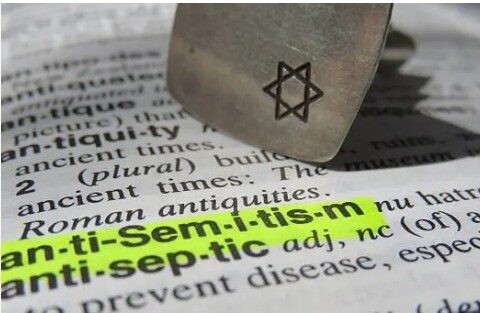Two Different Spellings
In 2015, the spelling of the word ‘anti-Semitism’ was challenged. In response to changes in political, social, and economic dynamics around the world, the International Holocaust Remembrance Alliance (IHRA) recommended to omit the hyphen and capitalization and change the spelling to antisemitism.
The IHRA recommends spelling “antisemitism” without a hyphen to avoid watering down the word’s real meaning, which is about opposing and hating the Jewish people. The association’s concern is “the hyphenated spelling allows for the possibility of something called ‘Semitism,’ which not only legitimizes a form of pseudo-scientific racial classification that was thoroughly discredited by association with Nazi ideology, but also divides the term, stripping it from its meaning of opposition and hatred toward Jews.” The IHRA wanted to ensure the term was written in a way that wasn’t open to interpretation, that is, antisemitism meant the hatred of Jews.
As a first step in this direction, IHRA sent Microsoft a memo asking to adapt their default auto-correct spelling policy so that the word would automatically be corrected according to the new unhyphenated version. The initiative reflected the IHRA’s commitment to ensuring clarity and accuracy in discussions surrounding antisemitism, emphasizing the importance of precise language in addressing prejudice and discrimination against Jews.
History of the Word Antisemitism
What is the origin of the controversy and why has this discussion emerged? To answer these questions, let’s go back to 1781 when the word ‘Semite’ appeared in a study discussing the Middle Eastern Semitic family of languages. The results of this study led to the false assumption that there were corresponding ‘Semites’ racial groups. This may have been the reason that in 1879, Wilhelm Marr, an atheist, agitator and journalist, selected the root ‘Semitic’ for his pamphlet, ‘The Way to Victory of Germanism over Judaism’ to discuss anti-Jewish views.
The term ‘antisemitism’ which in German is written as one word, became popular thanks to Marr who appears to have chosen it precisely because it denoted a semantic particularity, that is, it was detached from religious connotations to include all types of Jews. Indeed, the acclaimed historian Prof. Deborah Lipstadt, stated that Marr’s choice was intentional as he wanted to spread the idea that being Jewish did not only concern one’s religion but was above everything else, a biological trait.
Antisemitism and the Israeli-Arab Conflict
Fast forward to 1994, a period marked by high tension between Israelis and Palestinians. This may have been the reason Holocaust historian Yehuda Bauer wrote that “Anti-Semitism is altogether an absurd construction, since there is no such thing as ‘Semitism’ to which it might be opposed.”
It appears Bauer’s words were indirectly pointing at a growing phenomenon of a semantic spiritual confiscation of the term antisemitism to include Arabs, only to claim that they, (Arabs) could not possibly be antisemitic because they were Semitic. For example, in a 2015 speech given by consumer rights advocate Ralph Nader, he claimed “… the worst anti-Semitism in the world today is against Arabs and Arab-Americans…” Such attitudes led Lipstadt to stress that it was time to end the hyphen days “Because anti-Semitism is not hatred of Semitism or Semites – people who speak Semitic languages. Antisemitism is Jew hatred.”
Ken Jacobson, the Anti-Defamation League’s (ADL) deputy national director called the debate an “… overreaction to Arab claims that they can’t be anti-Semites because they are a Semitic people.” He added that in his opinion changing the spelling was not going to create a better understanding of antisemitism, in any case. Alvin H. Rosenfeld, director of Indiana University’s Institute for the Study of Contemporary Antisemitism contradicted Jacobson pointing out that introducing such a change “… may clarify that no one ever beat or cursed a Jew because he hated ‘Semitism,’ but only because he hated Jews.”
Adoption of IHRA Definition of Antisemitism
Like Microsoft, other organizations, municipalities and entities have started acknowledging and adopting the IHRA definition of Antisemitism. After six years, the Associated Press Stylebook (APStylebook) tweeted that it would adopt the hyphen-less spelling of ‘antisemitism’ also omitting the capitalization of Semitic. Although the notification came in April 2021 via a tweet without further explanation, in this, they seem to have finally come to terms with IHRA’s verdict concerning the term’s spelling.
At the beginning of 2023, good news came from Dictionary.com which announced it adopted the new version. More news came at the end of December 2023 as Rio de Janeiro’s Mayor, Eduardo Paes, signed a city-wide declaration adopting the IHRA Working Definition of Antisemitism. To conclude, so far, over 200 cities, states, and organizations have signed the declaration and hopefully more will follow in their footsteps.
What Does it Mean for Today?
Our organization, Fighting Online Antisemitism (FOA) searches for antisemitic content online based on the IHRA’s definition of the word. We are dedicated to eradicating antisemitism through reporting antisemitic content on social media, volunteer training, and raising awareness of the phenomena of cyberhate. In fact, the importance of defining antisemitism is the first step in preventing it, as Michal-Cotler-Wunsch, Israel’s Special Envoy for Combating Antisemitism suggested at a recent FOA workshop. In other words, if one does not know how to define antisemitism, one finds it difficult to identify and consequently, defending or preventing it is practically impossible. or how can one understand what antisemitic content is.
Currently, the leading social media networks (Facebook, Instagram, X and TikTok) do not include the IHRA definition of antisemitism in their hate speech policy and guidelines. Therefore, it is FOA’s mission to work with them toward changing their policies so as to help stop the spread of antisemitism online. Hopefully, more entities will adopt the IHRA definition, especially social networks. When we can define hate, we can prevent it from happening.

